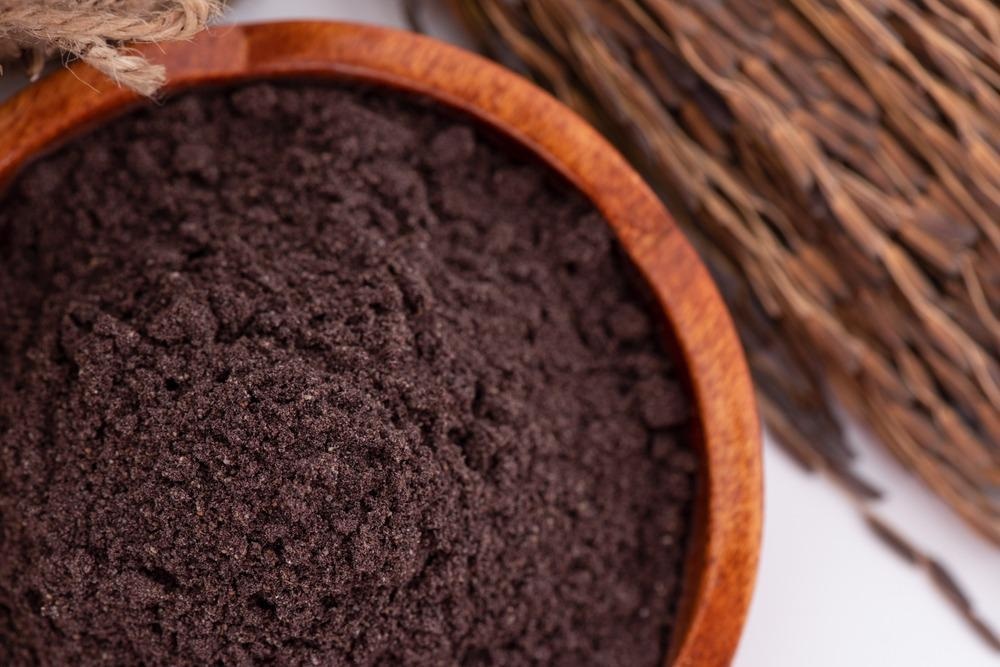The extraction of purple rice bran, an agriculture by-product rich in polyphenols, was used as an environmentally friendly biological corrosion inhibitor, also known as a green corrosion inhibitor, in work published in the Journal of Molecular Structure. Purple rice bran extract (PRBE) was tested on boiler quality (BQ) steel as a green corrosion inhibitor in HCl and H2SO4 to see how well it inhibited corrosion.

Study: New eco-friendly anti-corrosion inhibitor of purple rice bran extract for boiler quality steel: Experimental and theoretical investigations. Image Credit: wasanajai/Shutterstock.com
Inhibitors are one of the most effective ways to protect metals from corrosion. Numerous corrosion inhibitors are now in use, and these materials are either manufactured from low-priced raw materials or selected from substances with heteroatoms in their aromatic or long-chain carbon systems. The majority of these inhibitors, meanwhile, are environmentally damaging. The investigation of green corrosion inhibitors has resulted as a consequence of this.
The Problem of Corrosion
Corrosion is one of the most common failures of steel components in the industry, attracting the attention of experts from a variety of fields in order to prevent economic and social loss. Acid solutions are widely utilized for numerous objectives such as contaminant removal, cleaning, and degreasing in all major sectors such as sugar, paper, and textiles.
Hydrochloric acid and sulfuric acid are the most commonly utilized acids. Such acid liquids are harmful to metal components of businesses because they include a large concentration of protons, which cause the metal to corrode.
Scientists have devised several corrosion prevention technologies throughout the years to eliminate such undesired metal losses from metallic parts and alloys. Corrosion inhibitors are among the most extensively used convenient treatments since they are simple to apply and effective even in severe conditions at low concentrations.
Biomaterials Started to be Corrosion Inhibitor
For the past few years, scientists have been attempting to employ plant-derived biomaterials as a source of organic molecules with some excellent properties as environmentally benign corrosion protection in acidic environments.
Similarly, the valorization of different biomaterials and agriculture by-products is calling attention to the importance of boosting the financial potential of agricultural sectors, since these by-products feature a number of useful bioactive substances with a variety of applications.
How corrosion inhibitors protect metal: synthesis in the lab and testing
Video Credit: Applied Science/Shutterstock.com
Anthocyanin, a powerful antioxidant, is abundant in purple rice bran. Anthocyanin-containing bio-extract has previously been shown to be an effective natural corrosion preventative on metal surfaces, as anthocyanin contains heteroatoms, phenyl rings, and is water-soluble.
Purple Rice Bran as A New Anticorrosion
The utilization of purple rice bran extract (PRBE) as a new corrosion inhibitor in both HCl and H2SO4 acidic media is the subject of this study. However, there are only a few literary works that show how effective rice bran oil is at preventing corrosion on iron.
Purple rice bran is an excellent source of PRBE since it is a low-cost agro-byproduct that is both environmentally friendly and biodegradable. PRBE is also a more commercially viable material due to its simple, cost-effective, and energy-efficient extraction technique. These extracts also typically contain a variety of bioactive chemicals with heteroatoms and chemical bonding in their structure. They create compounds with metal, which aid in their adhesion to metallic surfaces.
The Advantage of PRBE
PRBE, which was derived from a by-product of the agriculture industry (purple rice bran), has the potential to be an environmentally benign organic corrosion inhibitor. The effectiveness of PRBE as green corrosion inhibitors was investigated through a series of experiments.
Electrochemical techniques were used to investigate the changes on the surfaces of BQ material in the presence of PRBE in acidic media, illuminating the corrosion kinetics and essential corrosion inhibition process of BQ steel by PRBE.
Because of the creation of a protective coating on the surface by the adsorption inhibitor molecules, its inhibitory efficiency improved when the concentration of PRBE was increased. The charge transfer difficulty of the metal/solution interface also reinforced this.
Further Research
In both acid mediums, the introduction of PRBE causes a notable variation in the microstructures of the BQ. Purple rice bran can be extracted with methanol. PRBE can be further investigated on other steel materials. In the elimination of PRBE, the acids corroded the surface by causing anodic and cathodic processes on the surface, as evidenced by the existence of cracks and trenches in both acid mediums.
In both acidic media, such extensively damaged formations were not present when the area was subjected to PRBE. In fact, in the influence of PRBE, the steel's surfaces was guarded by PRBE's phenols, which were absorbed on the surface of the steel and prevented the effective corrosion reaction sites. Using other types of rice bran can also be used to compare the result of PRBE and other rice bran as corrosion inhibitors.
References
Pal, A., and Das, C. New eco-friendly anti-corrosion inhibitor of purple rice bran extract for boiler quality steel: Experimental and theoretical investigations. Journal of Molecular Structure. Available online 24 November 2021. https://www.sciencedirect.com/science/article/pii/S0022286021021098?via%3Dihub
Disclaimer: The views expressed here are those of the author expressed in their private capacity and do not necessarily represent the views of AZoM.com Limited T/A AZoNetwork the owner and operator of this website. This disclaimer forms part of the Terms and conditions of use of this website.